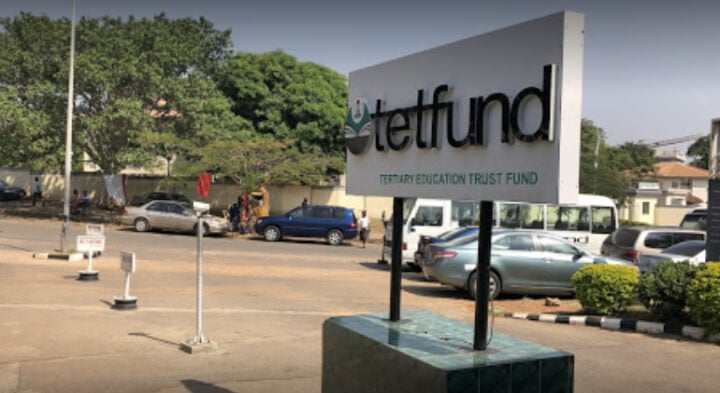On Tuesday, the Tertiary Education Trust Fund (TETFund) issued a rejoinder saying it did not award N7.6 billion contracts to two companies without due process.
On Tuesday, TheCable had reported that the agency awarded two contracts to Fides Et Ratio Academy and Pole Global Marketing (PGM) within two months at the cost of N3.8 billion respectively without the approval of the federal executive council (FEC), which is required for the contract size.
The contract was to provide capacity building course and learning management systems to about 2 million students across higher institutions in the country.
The rejoinder signed by Abdulmumin Oniyangi, TETFund spokesperson, noted that the agency did not make an attempt to usurp presidential powers or that of FEC, or award contracts without due process.
Advertisement
The agency said it was wrong to say they were contracts, whereas they were ICT projects implemented under a memorandum of understanding (MoU) which doesn’t require competitive bidding in public procurement.
TETFund further said its disbursement guidelines are approved by the president on the recommendation of the “Fund’s Board of Trustees and concurrence of the Honourable Minister of Education in line with the TETFund Act 2011”.
WHY TETFUND NEEDS TO MAKE FURTHER CLARIFICATION
Advertisement
An analysis of the rejoinder, however, shows that there are still a number of grey areas and unanswered questions that TETFund needs to clarify.
(1.) Was there a board at the time of the award?
(2.) The disbursement guidelines that was approved by the president was before the deduction from each institution’s allocation.
The disbursement guidelines, also referred to as the intervention budget, is subject to recommendation by the BoT and the minister and approval by the president. However, under the said disbursement guidelines, the sum of N100 million was allocated to universities and N50 million each to polytechnics and Colleges of Education as annual direct disbursement (ADD) for ICT intervention.
Advertisement
Annual direct disbursement means the amount should be used by the institutions themselves not through the Fund. Taking 50% of the ICT from the ADD was not approved by the president; thus the utilisation by TETFUND is illegal because only the president can alter or change the initial approval.
The Fund needs to produce evidence of presidential approval to that effect. In addition, there was no BoT in place; thus it was the minister who should have acted on behalf of the board. Even if there is a ministerial approval, this would not suffice because he is not the president and such an action would have amounted to the minister acting both as BoT and the president.
(3.) “The two projects under reference are not contracts but are ICT projects being implemented under a MoU arrangement with the following two global academies…”
There was no reference to any MoU in the Fides ET Ratio Academy contract letter.
Advertisement
The letter was titled ‘Re: Proposal for Capacity Building Course’, indicating that the award was in response to a proposal for capacity building by the company.
The approval letter to Fides Et Ratio says “Management has approved your engagement for capacity building certificate course”. Nowhere was Edunet Academy mentioned. “Engagement” is tantamount to contract award.
Advertisement
Also, the scope of work does not contain any reference to Edunet material as the specific standard or course content. There is no mention of any relationship between Edunet and Fides Et Ratio anywhere in the contract award letter.
For PGM, there was no reference to any umbrella MoU in the contract award letter. No reference to any privileged or representative relationship between Anthology and PGM. Rather, the award letter was written in response to a proposal from PGM: “I am directed to refer to your proposal on the above subject”.
Advertisement
(4.) The award letter goes on to say that approval has been granted and “you have been selected”. This indicates that a competitive process took place, which is contradicting the Fund’s new position that it is not a contract but projects that are being implemented under an MoU. Why was there a need for “selection” if indeed there was an umbrella MoU? Why was the MoU not referred to once in the award letter, if it was the basis for the project?
There was a requirement for the contractors to implement the project “in partnership with Anthology”, again not referencing any MoU as the basis for engaging the company.
Advertisement
(5.) TETFund did not respond to the illegality of paying a local company in dollars.
Which part of the Public Procurement Act 2007, as amended, provides for 70% and 85% advance payments?
In both cases, there was no advance payment guarantee or insurance bond, which is required for making advance payments.
While in (i) it is said that the projects are being executed under MOU; in (v), the position is that it was “during implementation, the committee recommended…….”. Does this mean that the two companies had been engaged before the MoU were signed with the IP owners? If so, what was the basis for their engagement and how can they not be deemed as contracts?
(6) “Your company shall be responsible for training the students on……”
Which part of TETfund’s mandate empowers it to engage contractors to take responsibility for delivering training to 2 million students while at the same time conducting train-the-trainer sessions for university staff?
TETFUND had no board during the award of the two contracts and no minister had been appointed at the time the second contract was awarded in June. What, therefore, was the approval process followed? Who approved the engagements and the award sums of 3.8 billion each which required FEC approval? Is this why contract awards are being relabelled as “projects” when the award letters were unambiguous in stating terms and scope of work for the companies being engaged which are different from the parties purportedly holding MoU?
What is the status of the Fides ET Ratio Academy project, given the volume of payment that has been made? Have two million students or the 502 TTT participants being trained? The award letter stipulates 70% advance and balance on completion.
Add a comment






